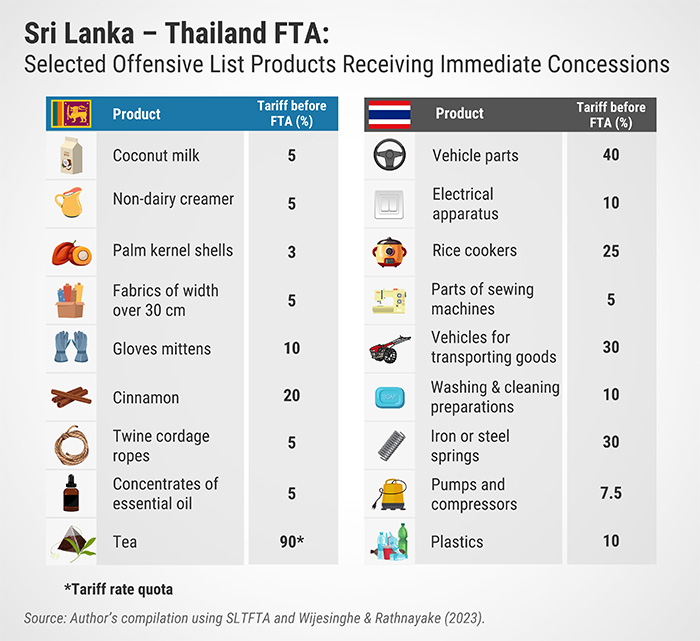Business
How the Sri Lanka-Thailand FTA paves the way for enhanced bilateral trade

Unlocking trade potential:
By Dr Asanka Wijesinghe
Dr Asanka Wijesinghe is a Research Fellow at IPS
with research interests in macroeconomic policy, international trade, labour and health economics. He holds a BSc in Agricultural Technology and Management from the University of Peradeniya, an MS in Agribusiness and Applied Economics from North Dakota State University, and an MS and PhD in Agricultural, Environmental and Development Economics from The Ohio State University.
(Talk with Asanka – asanka@ips.lk)
The Sri Lanka-Thailand Free Trade Agreement (SLTFTA) paves the way for lower tariffs on 85% of products between Sri Lanka and Thailand.
Strategic use of uncommitted lists to restrict imports from the partner country may weaken the effectiveness of SLTFTA.
The agreement opens avenues for trading new products, enhancing bilateral trade potential.
Thailand became the second Regional Comprehensive Economic Partnership (RCEP) economy to sign a free trade agreement (FTA) with Sri Lanka, following the FTA signed earlier with Singapore. A major goal of an FTA is to lower trade costs by reducing border tariffs and eliminating behind-the-border barriers for competitively traded products. This article assesses the coverage and potential of the Sri Lanka-Thailand FTA (SLTFTA) tariff liberalisation in increasing bilateral trade.
Coverage of the SLTFTA
Salient features of the SLTFTA tariff schedules include immediate concessions for a limited number of products, a 15-year phased tariff reduction plan for most of the products, and uncommitted products which are excluded from any commitment for tariff reduction or elimination. Notably, the tariff liberalisation programme is not limited to custom duties, but also expands to para-tariffs.
Given that 25.6% of products are already under zero tariffs in the case of Thailand, the SLTFTA commits to reduce or eliminate tariffs on 59.4% of products for Sri Lanka. Thailand provides immediate concessions for Sri Lanka over 2,188 products, while tariffs on 4,597 products will be subject to phased reduction within 15 years. Thailand’s uncommitted list includes 1,708 (or 15% of products).
By contrast, only 17.4% of products are under zero tariff currently in the case of Sri Lanka, implying that Sri Lanka will reduce or eliminate tariffs on 67.6% of products through the SLTFTA. Under the agreement, Sri Lanka commits to immediate concessions for 2,722 products (or 33.4%), reducing or eliminating tariffs on 2,796 products within 15 years, and maintaining 1,224 products on the uncommitted list (15%). By the end of the tariff phase-out, both countries will have 85% of products under zero tariffs, or tariffs liberalised under the SLTFTA.
Although both countries will maintain about 15% of products in their uncommitted tariff schedules, the corresponding import values are largely uneven. Based on 2022 values, Sri Lanka’s uncommitted list covers 39% of imports from Thailand while only 4% of imports from Sri Lanka are covered by Thailand’s uncommitted list. Sri Lanka excludes major Thai imports like sugar, cement clinkers, many rubber products in HS chapter 40, food imports like seafood, manioc, red onions, lubricants, and cotton in the uncommitted list. The import-competing industries and revenue considerations incentivise Sri Lanka to retain policy flexibility in setting tariffs for these products. Sri Lanka exports 74% of products by value under zero tariff in pre-SLTFTA.
The Offensive Lists: A Closer Look
The effectiveness of an FTA hinges on offensive lists – products with a comparative advantage and potential for expanded trade. A recent IPS study identified 147 six-digit HS codes as Thailand’s offensive list and 154 six-digit HS codes as Sri Lanka’s offensive list.
Under the SLTFTA, of the 147 six-digit codes in Thailand’s offensive list, Sri Lanka’s tariff schedule contains 413 products at the more disaggregated eight-digit HS codes. As such, Thailand will receive tariff concessions for 71.7% of these offensive list products. However, some of the offensive list products are in Sri Lanka’s uncommitted products list – although just 117 in number, they account for USD 57.8 Mn or 19.8% of Sri Lanka’s imports from Thailand in 2022.
Similarly, of the 154 six-digit HS codes identified as Sri Lanka’s offensive list, Thailand’s tariff schedule contains 457 such products at eight-digit HS codes. Unlike Sri Lanka though, only 25 such products are on Thailand’s uncommitted list, accounting for 3.6% of Thailand’s imports from Sri Lanka in 2022. Additionally, although Thailand puts 12 ready-made garment products (USD 3.6 Mn or 4.2% of imports) from Sri Lanka’s offensive list in its uncommitted list, 130 offensive list products (USD 3.6 Mn or 4.2% of imports) from HS chapters 61 and 62 will see tariffs phased-out. Out of these 130, Thailand did not import 68 products in 2022 from Sri Lanka.
For Sri Lanka, the immediate concessions given for offensive list products include tariff rate quotas for desiccated coconut, green tea, and black tea. Provided that Sri Lanka has a high comparative advantage in tea and desiccated coconut, and the existing high tariffs on these by Thailand, the quota under SLTFTA is a relatively positive outcome for Sri Lanka. However, the quantity under the tariff rate quota can be quite low and efficient distribution of quotas might be administratively challenging.
Dissecting the SLTFTA: Potential for Increased Bilateral Trade
The substantial coverage of the SLTFTA, binding commitments for phase-out tariff reduction, applying tariff reduction to para-tariffs, and a tariff rate quota for Sri Lanka’s tea are positive features. Both countries receive tariff reductions or elimination for the majority of each country’s offensive products. However, the strategic use of uncommitted lists to restrict imports from the partner country may weaken the effectiveness of the FTA. Sri Lanka’s uncommitted list notably includes rubber products, ceramic tiles, sinks, washbasins, ceramic tableware, soaps, detergents, beverages, and sugar and confectionery items, reflecting existing trade distortions and suggesting limited potential for FTAs to address incentive distortions. Yet, given the political challenges of a comprehensive tariff overhaul, limited liberalisation through FTAs emerges as a viable second-best option for policymakers.
Similarly, Thailand excludes vital ready-made garment products and agricultural products like tuna and black pepper from the SLTFTA tariff liberalisation. However, the exclusion is limited to 25 offensive list products of Sri Lanka.
Overall, the potential for a swift increase in bilateral trade in already traded products is low given that immediate concessions cover a lower percentage of products, and the major currently traded products are already under zero tariffs. However, the SLTFTA removes bilateral tariffs on competitively exported products by both countries, opening a window for increased trade over time. Currently, many products in the offensive lists which get tariff concessions under SLTFTA, are not traded bilaterally.
The trade effect of SLTFTA may come from trading new products that were not traded bilaterally before the FTA due to bilateral trade frictions. Accordingly, products in the offensive lists that receive immediate concessions are better candidates for increased bilateral trade (see Infographic). Dissemination of accurate information on tariff concessions, and eligibility criteria including rules of origin, linking exporters to potential buyers through market facilitation, and investment promotion may increase bilateral trade in these products.
Infographic: Sri Lanka – Thailand FTA: Selected Offensive List Products Receiving Immediate Concessions
Link to original blog: https://www.ips.lk/talkingeconomics/2024/02/28/unlocking-trade-potential-how-the-sri-lanka-thailand-fta-paves-the-way-for-enhanced-bilateral-trade/
Business
AHK Sri Lanka champions first-ever Sri Lankan delegation at Drupa 2024

The Delegation of German Industry and Commerce in Sri Lanka (AHK Sri Lanka) proudly facilitated the first-ever Sri Lankan delegation’s participation at Drupa 2024, the world’s largest trade fair for the printing industry and technology. Held after an eight-year hiatus, Drupa 2024 was a landmark event, marking significant advancements and opportunities in the global printing industry.
AHK Sri Lanka played a pivotal role in organising and supporting the delegation, which comprised 17 members from the Sri Lanka Association for Printers (SLAP), representing eight companies from the commercial, newspaper, stationery printing, and packaging industries. This pioneering effort by AHK Sri Lanka not only showcased the diverse capabilities of Sri Lanka’s printing sector but also facilitated vital bilateral discussions with key stakeholders from the German printing industry.
Business
Unveiling Ayugiri: Browns Hotels & Resorts sets the stage for a new era in luxury Ayurveda Wellness

In a captivating reimagining of luxury wellness tourism, Browns Hotels & Resorts proudly unveiled the exquisite Ayugiri Ayurveda Wellness Resort Sigiriya. This momentous occasion, celebrated amidst a vibrant and serene grand opening on the 6th of June, heralds a new chapter in the Ayurveda wellness tourism landscape in Sri Lanka. Nestled amidst 54 acres of unspoiled natural splendour, Ayugiri features 22 exclusive suites and stands out as the only luxury Ayurveda wellness resort in the country offering plunge pools in every room, rendering it truly one-of-a-kind.
The grand opening of Ayugiri Ayurveda Wellness Resort was an enchanting event, where guests were captivated by the melodies of flutists and violinists resonating through Sigiriya’s lush landscapes. As traditional drummers and dancers infused the air with vibrant energy, Browns Hotels & Resorts’ CEO, Eksath Wijeratne, Kotaro Katsuki, Acting Ambassador for the Embassy of Japan and General Manager, Buwaneka Bandara, unveiled the resort’s new logo, marking a significant moment witnessed by distinguished guests from the French Embassy, Ayurveda and wellness enthusiasts along with officials from the Sigiriya area, LOLC Holdings and Browns Group.
“Our strategic expansion into wellness tourism with Ayugiri Ayurveda Wellness Resort Sigiriya symbolises a significant milestone for Browns Hotels & Resorts. Wellness tourism has consistently outperformed the overall tourism industry for over a decade, reflecting a growing global interest in travel that goes beyond leisure to offer rejuvenation and holistic well-being. By integrating the timeless wisdom of Ayurveda with modern luxury, we aim to set a new standard in luxury wellness tourism in Sri Lanka. Whether your goal is prevention, healing, or a deeper connection to inner harmony, Ayugiri offers a sanctuary for holistic well-being” stated Eksath Wijeratne.
Ayugiri encapsulates the essence of life, inspired by the lotus flower held by the graceful queens of the infamous Sigiriya frescoes. Just as the lotus emerges from the murky depths, untainted and serene,
Ayugiri invites guests on a journey of purity and rejuvenation, harmonised with a balance of mind, body and spirit, the essence of nature, echoes of culture and the wisdom of ancient Ayurvedic healing.
Business
HNB General Insurance recognized as Best General Bancassurance Provider in Sri Lanka 2024

HNB General Insurance, one of Sri Lanka’s leading general insurance providers, has been honored as the Best General Bancassurance Provider in Sri Lanka 2024 by the prestigious Global Banking and Finance Review – UK.
The esteemed accolade underscores HNB General Insurance’s unwavering commitment to excellence and its outstanding performance in the field of bancassurance. Through dedication and hard work, the HNB General Insurance team has continuously endeavored to deliver innovative insurance solutions, cultivate strong relationships with banking partners, and provide unparalleled service to customers nationwide. This recognition is a testament to the team’s dedication and relentless pursuit of excellence in the bancassurance business.
“We are honored to receive this prestigious award, which reflects our team’s tireless efforts and dedication to delivering value-added insurance solutions and exceptional service through our bancassurance partnerships,” said Sithumina Jayasundara, CEO of HNB General Insurance. “This recognition reaffirms our position as a trusted insurance provider in Sri Lanka and motivates us to continue striving for excellence in serving our customers and communities.”

 Dr Asanka Wijesinghe is a Research Fellow at IPS
Dr Asanka Wijesinghe is a Research Fellow at IPS










